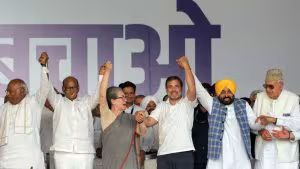In the realm of Indian politics, the stage is set for a gripping narrative as the National Democratic Alliance (NDA) prepares to anoint its choice for the pivotal role of Speaker in Parliament. Simultaneously, the Indian National Developmental Inclusive Alliance (INDIA) bloc readies its strategic arsenal, aiming to influence the course of parliamentary proceedings and uphold democratic ideals. This unfolding saga not only reflects the intricacies of coalition politics but also underscores the essence of democratic checks and balances.
The NDA’s Deliberations
Within the confines of coalition dynamics, the NDA meticulously weighs its options for the Speaker’s chair. The alliance’s nominee is expected to embody a blend of parliamentary experience, impartiality, and administrative prowess. Speculation abounds as political stalwarts within the NDA vie for this esteemed position, cognizant of the pivotal role the Speaker plays in shaping legislative agendas and fostering robust debate.
INDIA Bloc’s Strategic Imperative
On the opposition front, the INDIA bloc orchestrates a strategic imperative rooted in unity and consensus. Their candidate selection process transcends partisan lines, emphasizing a commitment to inclusive development and democratic principles. This strategic gambit aims to present a formidable challenge to the NDA’s nominee, signaling a broader narrative of parliamentary accountability and public representation.
Unity Amidst Diversity
Central to the INDIA bloc’s narrative is the narrative of unity amidst diversity. By rallying behind a consensus candidate, they showcase a united front capable of steering parliamentary discourse towards issues of public interest and welfare. This unity extends beyond political expediency, symbolizing a collective commitment to democratic norms and governance transparency.
The Significance of the Speaker’s Chair
The Speaker’s election isn’t merely a ceremonial affair; it holds immense significance in shaping the functioning of Parliament. A Speaker aligned with the ruling coalition may streamline legislative processes, while an opposition-backed Speaker serves as a crucial check on executive power. This contest epitomizes the delicate balance of power within a democratic framework, highlighting the essence of parliamentary democracy.
Navigating Political Waters
Recent developments unveil the intricate maneuvers within both alliances. Reports of intense deliberations and consultations within the NDA hint at the gravity of their decision-making process. Conversely, the INDIA bloc’s outreach efforts and consensus-building initiatives underscore a concerted effort to influence the Speaker’s election and assert their vision for parliamentary governance.
Charting a New Narrative
As the narrative unfolds, India’s political landscape witnesses a tapestry of ambition, strategy, and democratic fervor. The clash between the NDA’s nominee and the INDIA bloc’s consensus candidate encapsulates the essence of political contestation within a vibrant democracy. Beyond individual personalities, this electoral battle embodies the aspirations of a nation striving for accountable governance and representative democracy.
Conclusion:
The looming battle for the Speaker’s chair within the Indian Parliament heralds a paradigm shift in the nation’s democratic fabric. As the National Democratic Alliance (NDA) and the Indian National Developmental Inclusive Alliance (INDIA) bloc gear up for a clash of ideologies and strategies, the significance of this electoral spectacle transcends mere political maneuvering.
At its core, this contest epitomizes the essence of democratic governance—the seamless interplay of power, accountability, and representation. The NDA’s deliberations underscore the weight of responsibility in choosing a Speaker who can navigate legislative complexities while upholding the principles of fairness and impartiality. Conversely, the INDIA bloc’s strategic imperative signifies a collective commitment to democratic norms, unity amidst diversity, and a robust check on executive authority.
The Speaker’s chair, often seen as a ceremonial post, emerges as the fulcrum of parliamentary dynamics, influencing legislative agendas, fostering constructive debates, and ensuring transparency in governance. The outcome of this electoral duel will not only shape the functioning of Parliament but also resonate with the aspirations of millions of citizens yearning for responsive and accountable governance.
As the final curtain rises on this political saga, India stands at a crossroads—a juncture where democratic ideals converge with strategic calculations, and the will of the people intersects with political ambitions. The journey towards selecting the Speaker embodies the essence of democratic evolution—a relentless pursuit of a more inclusive, transparent, and participatory governance framework.
Regardless of the victor, the real winner will be Indian democracy itself, reaffirming its resilience, adaptability, and enduring commitment to the values enshrined in its constitutional ethos. The saga of the Speaker’s election serves as a testament to the vibrancy of India’s democratic institutions, where every voice matters, and every decision resonates with the hopes and dreams of a nation on the cusp of transformative change.



